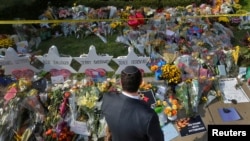Reported incidents of assault, vandalism and harassment targeting Jews in the United States rose to new “historic levels” last year, the Anti-Defamation League said on Thursday.
In its annual “Audit of Antisemitic Incidents,” the Jewish civil rights organization said it documented 3,697 such incidents in 2022, up 36% from 2021, and the highest level since the group started keeping records in 1979.
This was the third time in the past five years during which antisemitic incidents have set a record high, the ADL said.
The dramatic increase, the ADL said, was part of a five-year climb that has seen a doubling of antisemitic incidents since 2018, when a white supremacist killed 11 worshippers at a Pittsburgh synagogue in the deadliest attack on the American Jewish community in U.S. history.
ADL President Jonathan Greenblatt said while no single element accounted for last year’s surge in antisemitism, a number of contributing factors were at play.
Among them: an increase in white supremacist propaganda activity, attacks on Orthodox Jews, a spike in bomb threats made to Jewish institutions and significant increases of anti-Jewish incidents in schools and on college campuses.
“This data confirms what Jewish communities across the country have felt and seen firsthand — and corresponds with the rise in antisemitic attitudes,” Greenblatt said in a statement. “From white nationalists to religious fanatics to radical anti-Zionists, Jewish people see a range of very real threats. It’s time to stop the surge of hate once and for all.”
The ADL audit documents three types of anti-Jewish incidents — assault, harassment, and vandalism — and the group said cases in all three categories rose last year.
There were 111 physical assaults directed at Jews, an increase of 26%. The violence targeted 139 victims, most of them visibly Orthodox Jews, and left one person dead. In October, a University of Arizona professor was shot and killed by a former student who believed the professor was Jewish.
Cases of harassment involving victims of antisemitic slurs, stereotypes or conspiracy theories jumped 29% to 2,298 incidents.
Acts of vandalism such as the destruction of property soared 51% to 1,288 incidents, with swastikas present in most cases.
In tracking anti-Jewish actions and statements, the ADL uses a definition of antisemitism adopted by the International Holocaust Remembrance Alliance, a Sweden-based non-profit organization.
According to the IHRA definition, antisemitism is “a certain perception of Jews, which may be expressed as hatred toward Jews.”
While the definition has been used by the U.S. Department of State, it is contested, with progressive Jewish groups saying that by equating criticism of Israel with antisemitism, it stifles free speech.
The ADL says it doesn’t conflate criticism of the Jewish state or anti-Israeli activism with antisemitism.
Its audit, however, includes cases where individuals have been harassed for their actual or perceived support of Israel or Zionism.
The spike in antisemitic incidents came against the backdrop of rising religiously motivated hate crimes, according to Brian Levin, director of the California-based Center for the Study of Hate and Extremism.
“There has been an increase in recent years, not only in overall hate crime, but religion hate crime as well, and anti-Jewish hate on top of that,” Levin said in an interview.
“What the (ADL) report shows is that the crime data that we compile is really only the tip of the iceberg in how antisemitism is becoming more mainstream.”
According to the FBI’s most recent figures, hate crimes motivated by religious bias rose from 1,297 in 2016 to 1,590 in 2021, an increase of 22%.
In a forthcoming report, the Center for the Study of Hate and Extremism says that “religion hate crime” in major U.S. cities rose 27% last year, with anti-Jewish incidents accounting for 78% of the total, followed by ant-Muslim cases with an 8% of the share.
Not every incident documented by the ADL rises to the level of a hate crime, which the FBI defines as a criminal offense motivated by animus against the victim’s race, religion, disability, sexual orientation, ethnicity, gender or gender identity."
“Certainly vandalism, for the most part, would be criminal along with the assaults,” Levin said. “The big question is how much of the harassments are actually criminal.”
Whatever the case, the incidents show the growing mainstreaming of antisemitism, Levin said.
The recent rise in anti-Jewish hate has not been limited to the United States, researchers say.
A study by Tel Aviv University found that several countries with large Jewish populations – the U.S, Canada, the United Kingdom, Germany and Australia – saw a “sharp rise” in antisemitic attacks in 2021.
The surge was fueled by “the radical populist right and the anti-Zionist radical left,” the report said.






